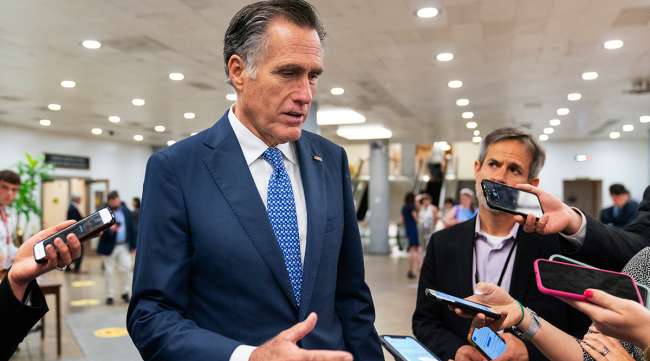Romney, Senators Map Rival Infrastructure Plan With No Tax Hikes

[Stay on top of transportation news: Get TTNews in your inbox.]
The Biden administration is expecting a new infrastructure proposal this week from a bipartisan group of lawmakers, but those legislators are moving forward without any of the tax hikes the president has demanded to pay for his plan.
The group of senators — which includes at least five Democrats and a handful more Republicans — has decided against using corporate or individual income tax increases to pay for spending on infrastructure projects, according to a senator involved in the talks.
“There are no tax increases. That is a red line for us,” said Sen. Mitt Romney (R-Utah), who has taken a leading role in crafting the proposal. “There are no user fees,” he also said, referring to a pay-for method the White House had rejected for putting a greater burden on lower-income Americans. Romney didn’t specify how the bill could be funded but said it wouldn’t add to the deficit.
Lack of agreement on a funding mechanism was a key reason for the collapse of direct talks between President Joe Biden and Republican senators led by Shelley Moore Capito of West Virginia. Failure to reach a deal on that score could boost chances of relying on new debt for any bipartisan infrastructure bill, or a shift in focus to a Democrat-only spending bill.
Biden has called for raising levies on businesses, including a bump in the domestic corporate rate to 28% from 21%, but Republicans have said that’s a nonstarter for them to vote for any bill.
“The president doesn’t have the votes to do it his way. He can try. He can keep trying,” Sen. Pat Toomey (R-Pa.) said in an interview June 9 with Bloomberg TV’s David Westin, expressing skepticism that 10 Republicans would vote to undo President Donald Trump’s 2017 tax cut.
Ten GOP senators would be needed to get a bill through the 50-50 Senate, avoiding the budget-reconciliation route that allows for a simple majority but places restrictions on items that can be included.
Romney said the key to determining whether the bipartisan group can produce an offer this week would be whether “there is sufficient support from other Republican senators for our proposal or not.” He said eight or nine GOP members are now in the group.
Some Republicans also are raising concerns about the impact on the federal debt, even as they back spending on physical infrastructure like roads, bridges and airports while opposing any tax increases.
“We can’t keep borrowing money like this,” Sen. Rick Scott (R-Fla.) said in a separate Bloomberg TV interview. “Let’s do real infrastructure, and let’s pay for it.”
Biden left on a trip to Europe June 9, but the administration is keeping in touch with the Senate group.
“We are engaged with a bipartisan group that we anticipate is going to be bringing forward ideas this week,” White House National Economic Council Director Brian Deese said at an event hosted by Axios June 9. Biden “is not going to stop looking for areas to find common ground, and at the same time, what you have heard from him is that his only red line is inaction.”
A separate group, the Problem Solvers Caucus of 58 Republican and Democratic House members, is also working on its own compromise bill, and its leaders say they’re in contact with members of the Senate group.
Democrats are also preparing for a go-it-alone strategy if this round of bipartisan negotiations also falls apart. Senate Majority Leader Chuck Schumer has instructed his members to prepare for both a bipartisan bill as well as the budget reconciliation procedure, which requires all 50 Democratic votes in the Senate.
House and Senate committees in the meantime are working on specific elements of Biden’s economic plans, including a surface-transportation bill.
The bipartisan group of senators, including Democrats Joe Manchin of West Virginia, Kyrsten Sinema of Arizona, Jeanne Shaheen of New Hampshire, Mark Warner of Virginia and Jon Tester of Montana, along with Republicans Romney, Bill Cassidy of Louisiana, Lisa Murkowski of Alaska, Susan Collins of Maine and Rob Portman of Ohio, met on Capitol Hill June 8 in an effort to forge a new infrastructure offer to the White House. They vowed afterward to keep talking.
Want more news? Listen to today's daily briefing below or go here for more info:




